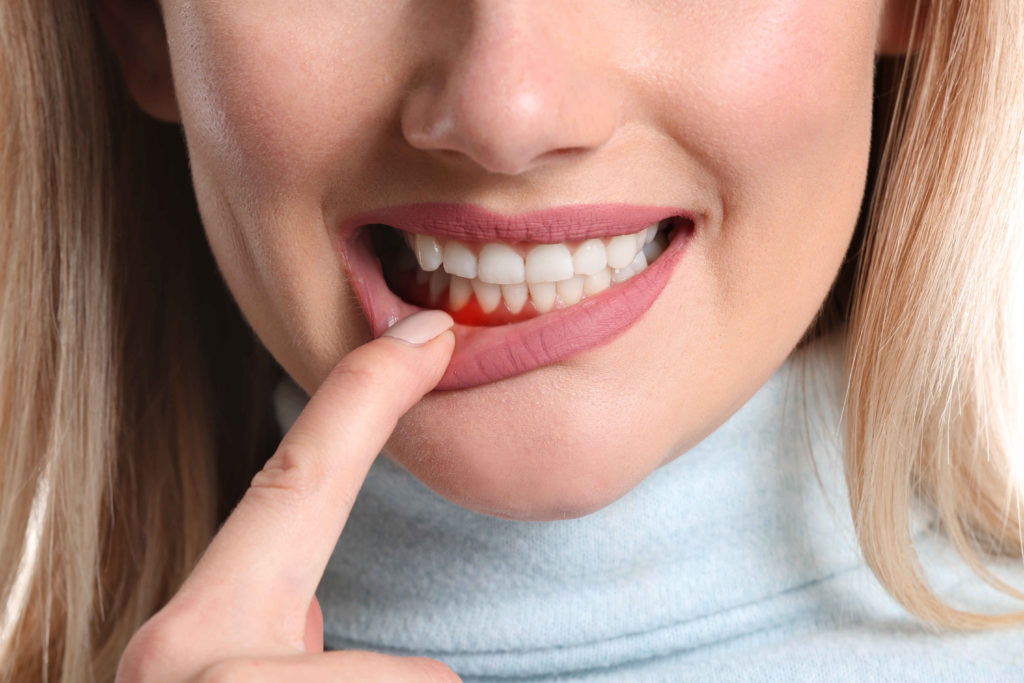We often talk about gestures to keep your teeth whiteBut more rarely, what you need to do to keep your gums healthy. This part of the oral mucosa covers the jawbone. It is just under half a centimetre thick, and tends to thin with age. The health of the oral mucosa is extremely important. Poor gum hygiene can quickly lead to gingivitis and other pathologies.
What do healthy gums look like?
When gums are healthy, they have a pale pink color and lie firmly against the tooth. What's more, they don't bleed when brushing or eating.
How do you recognize diseased gums?
Made up of bacteria, dental plaque takes the form of a thin, whitish layer. It can also calcify and become tartar. You'll then see a dark border at the junction between teeth and gums. This can potentially lead to infection and pain, and then to tooth decay. gum or periodontal diseaseor even loosening of the tooth.
Here are the main symptoms of diseased gums:
- Gums are swollen and irritated.
- Their color turns red or purple.
- Gums bleed easily when brushing or flossing.
- Teeth become sensitive to hot and cold.
- Breath constantly smells bad.
- Gaps appear between teeth and gums.
If you notice one or more of these symptoms, we recommend that you consult a dentist in Fribourg or Lausanne. This damage is reversible if treated early, before it affects the periodontium. Prevention is always better than cure. That's why we're sharing 6 tips to help you maintain healthy gums.
1. Brush your teeth twice a day.
L'World Health Organization recommends brushing twice a day. This is the minimum required for good oral hygiene. Ideally, you should brush your teeth after every meal to remove all food residues. Brush your tongue too, as it can also harbour bacteria. Choose a soft toothbrush that's the right shape and size for your mouth. Not sure you're doing it right? Choose a electric toothbrush rather than a manual model. Finally, don't forget to change the brush head on average every 3 to 4 months.
2. Use fluoride toothpaste.
As far as toothpaste is concerned, the Swiss Society of Dentists recommends fluoride products. Fluoride is reputed to strengthen enamel, protect against acid attack and prevent tooth decay. It also helps remineralize teeth. A fluoride toothpaste helps keep gums healthy. It should not be swallowed, however, as excessive fluoride consumption is toxic to the body.
3. Clean interdental spaces.
Dentists in Lausanne and Fribourg recommend cleaning interdental spaces at least once a day. Whether you do it in the morning, after lunch or in the evening, the important thing is to do it. You can use brushes, floss or dental floss, whichever suits you best. This removes plaque and food residues that hide between your teeth. They're out of reach of your toothbrush.
4. Use a mouthwash.
There are several mouthwashes designed to prevent gingivitis. These products complement tooth brushing and interdental cleaning. This complete daily routine ensures oral hygiene optimal. Your dental hygienist in Fribourg or Lausanne will advise you on the right mouthwash for your needs.
5. Stop smoking.
Visit effects of smoking on oral hygiene have long been scientifically proven. Smoking affects your breath, the health of your teeth and your gums. Smoking weakens your immune system. As a result, your body finds it harder to fight off infection, including gum infection. What's more, smokers' gums take much longer to heal after an illness. All the more reason to quit smoking!
6. Descale regularly.
Only a dentist can examine your oral cavity to detect a problem and treat it. That's why you should visit a dental practice in Fribourg or Lausanne at least once a year. To keep your teeth and gums healthy, we recommend regular professional scaling. Depending on your eating habits and whether you smoke, the frequency can vary from once a year to once every two years.
Make an appointment at one of our HELVIDENT dental clinics in Fribourg, Lausanne and Aigle. Our team includes dental hygienists, dentists and specialists. We'll give you additional advice on how to care for your gums.

